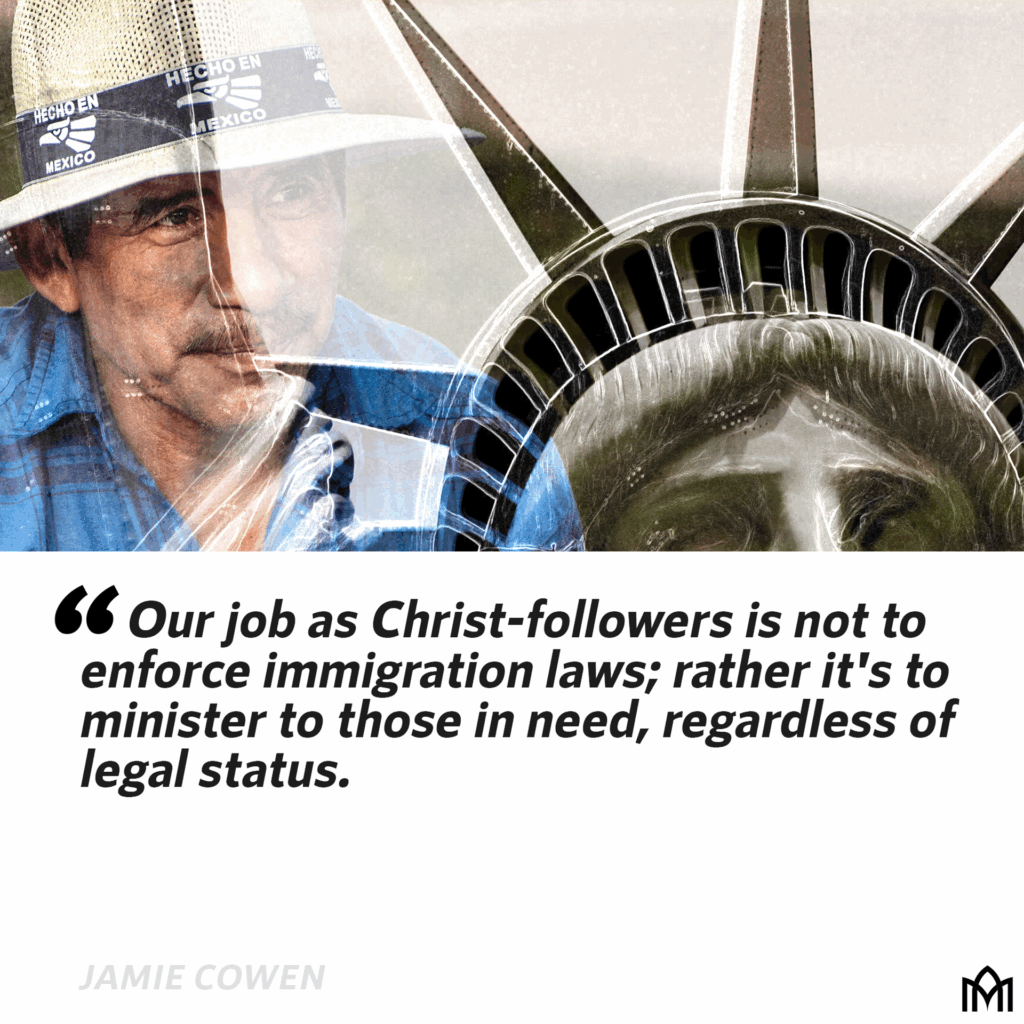How We Treat Immigrants
Scripture is clear: “The foreigner residing among you must be treated as your native born. Love them as yourself, for you were foreigners in Egypt. I am the Lord” (Leviticus 19:34).
According to the prophets, Israel was judged severely for mistreating the foreigner. Who are foreigners in our day? Immigrants, legal and illegal. I’ve worked with immigrants for over 30 years, both as a congregational leader and a lawyer. Our congregation in Virginia worked with numerous immigrants. Most of them were legal, but some were not. Our members provided them with all kinds of services. On one occasion, one of our members discovered an immigrant family they were assisting were not legally present. They asked me if it was right to help them.
My answer: Our job as Christ-followers is not to enforce immigration laws; rather it’s to minister to those in need, regardless of legal status.
The inscription on one of America’s greatest landmarks, the Statue of Liberty, declares, “Give me your tired, your poor, your huddled masses, yearning to breathe free.”1Quoted from the sonnet “The New Colossus,” by American poet Emma Lazarus. Emma wrote this poem in 1883 in part to raise money for the construction of a pedestal for the Statue of Liberty. See https://en.wikipedia.org/wiki/The_New_Colossus for further detail. My grandparents were the recipients of that offer. Without it, they would have perished in the Holocaust. Most immigrants to the US simply want a better life. Studies overwhelmingly show that immigrants, including undocumented ones, commit fewer crimes per capita than US citizens.2Abramitzky, R., et al, Law-Abiding Immigrants: The Incarceration Gap between Immigrants and the US Born, 1870-2020, National Economic Research, March 2024.
As an immigration lawyer, I love working with immigrants. They are some of the most interesting people, with fascinating family stories. The fact that someone upends their life and that of their family by relocating to another country where they often don’t know the language or the culture, and then from scratch try to earn a living, is simply awe inspiring to me. That’s not to suggest that there shouldn’t be immigration restrictions. A country must control its own borders. However, the Bible is clear as to how we treat the strangers in our midst.
Our job as Christ-followers is not to enforce immigration laws; rather it's to minister to those in need, regardless of legal status.' Share on X
Rounding up immigrants (even those who are not here legally) and shipping them to dangerous places around the world is a blight on our society. Churches should be a refuge for the lost and needy amongst us, including immigrants. Now is an especially important time to minister to and seek to protect them. As an immigration lawyer, my pragmatic, legal advice to pastors and other religious leaders who work with immigrants is the following:
-
- Immigrants with green cards should apply for US citizenship at the earliest opportunity. Revoking US citizenship is much harder than revoking a green card.
- Those in the US with visas, such as student visas and even work visas, should avoid foreign travel unless absolutely necessary. Visas can be revoked at border entries for almost any reason.
- Those in the US with undocumented status should immediately make appointments with immigration attorneys to know their rights, and to keep the attorneys’ numbers handy in case of being picked up by US Immigration and Customs Enforcement (ICE). These agents can whisk people away with almost no notice.
- A pastor is within their legal rights to refuse entrance to their institution by ICE agents unless the raid is accompanied by a federal warrant issued by a judge.3See https://immigrantjustice.org/know-your-rights/ice-encounter.
Beyond legal issues, immigrants tend to be more open to the gospel than American citizens who were born in America. We experienced this in the Messianic Jewish congregation I led for over twenty years. In the late 1980’s through the 1990’s, hundreds of thousands of Russian Jews immigrated to the US following the fall of the Soviet Union. In response, we opened a non-profit subsidiary organization in our congregation, called Russian Immigration Services. We provided extensive legal and social services to the Russian immigrant community in our city.
In 1995, one of our Russian staff asked us to host a Victory Day celebration for the 50th anniversary of the defeat of the Nazi regime. She said that she initially asked the local Jewish Community Center to host the event, but they refused. I agreed that our congregation would host, not realizing what we were getting into. I didn’t know anything about Victory Day, but soon discovered that it was the most celebrated holiday of the year during the Soviet era. Over 27 million Russians died during World War II, and 1995 was the 50th anniversary of the Nazi defeat.
I studied how the day was celebrated in Russia, and we tried to replicate the day as faithfully as possible. Typically, Russian WWII veterans would dress in their former military uniforms with medals awarded during the war. Thus, we fashioned a special 50th anniversary medal with a US flag. We had our US soldiers’ members pin the medals on the veterans’ uniforms during the ceremony. We had a Russian band play World War II-era Russian music, and then had a big party afterwards. With that one event, we won the hearts of the entire Russian community in our city. The result of this hospitable welcome was significant: Many of them began attending special Bible studies that we organized. To this day, several of these Russian immigrants remain good friends of mine after 30 years.
Most immigrants to the US simply want a better life. Studies overwhelmingly show that immigrants, including undocumented ones, commit fewer crimes per capita than US citizens. Share on X
There are practical, simple ways churches can step in to help immigrant communities experience the love of Jesus:
-
- If your congregation doesn’t have an online service, you should consider beginning one so that undocumented immigrants afraid to attend in person can remain part of your faith community.
- When our congregation ministered to new Russian immigrants, we opened a food bank in our building. A local church can do the same, but then add a delivery service for those who fear coming out to collect groceries.
- If a church doesn’t have a robust home group ministry, it can form them, again for the purpose of including the undocumented in less public forums.
- A church can put an immigration attorney on retainer, so they would be available for those who can’t afford these critical legal services when they are most urgently needed.
Jesus was clear in teaching his disciples to bear good deeds to all without condition or qualification: “Let your light shine before others, that they may see your good deeds and glorify your Father in heaven” (Matthew 5:16). Near the end of his ministry, Jesus condemned those who failed to feed the hungry, to quench their thirst, and to block the stranger from coming in (Matthew 25:31-46). Scripture couldn’t be more clear: Now is the time to boldly showcase the love of God, especially to the stranger.
///
A pastor is within their legal rights to refuse entrance to their institution by ICE agents unless the raid is accompanied by a federal warrant issued by a judge. Share on X




